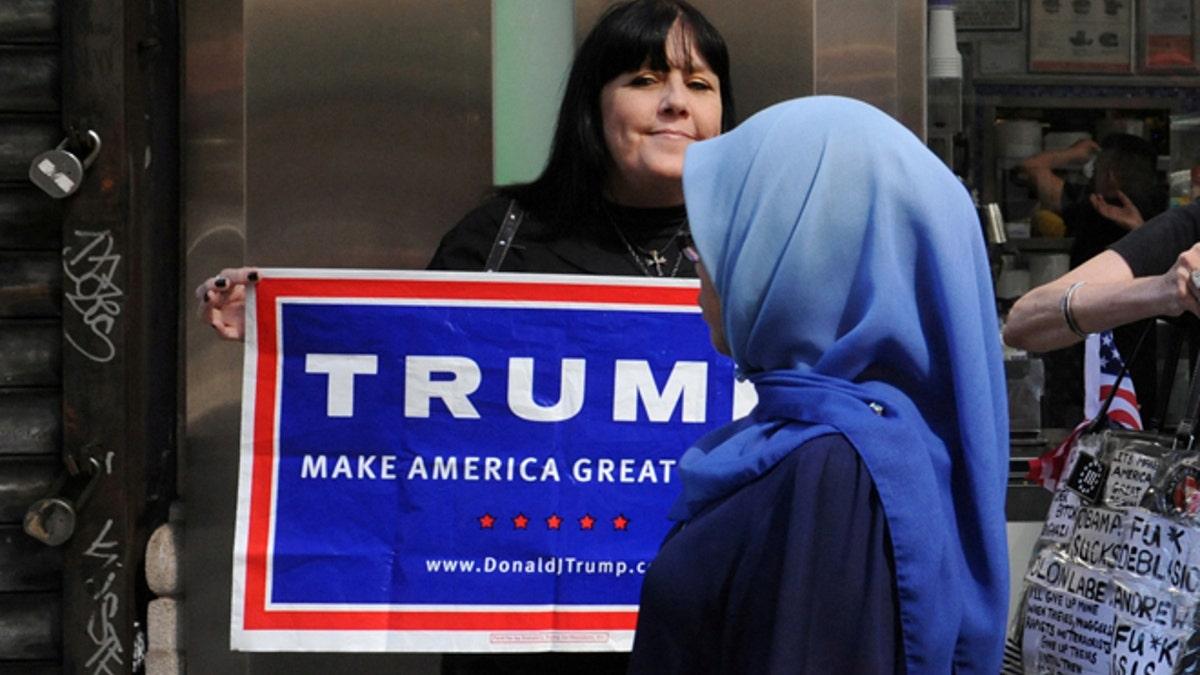
A woman wearing a Muslim headscarf walks past people holding U.S. Republican presidential nominee Donald Trump signs before the annual Muslim Day Parade in the Manhattan borough of New York City, September 25, 2016. REUTERS/Stephanie Keith/File Photo
Since President-elect Donald Trump's victory, people have taken to social media with concerns and fears about the incoming administration. Riots, protests and the creation of safe spaces on college campuses have rose in the wake of an election that has left the country deeply divided.
But Ali Olaikhan, a Muslim-American, argues Trump's comments were taken out of context.
“I'm a Muslim, and I know what he says about Muslims,” said Olaikhan. “I understand what he means. He's talking about the terrorists or the extremists, of course."
Trump, a billionaire real estate mogul and reality TV star, stunned the nation as he pulled off one of the biggest political upsets in history. Olaikhan said he was happy, but for the majority of registered Muslim voters, the election elicited a much different reaction.
“The first word I said when he won was ‘chaos,’” Abbas Abdul, a truck driver and former Department of Defense contractor, said. “I expected something to happen the next day.”
A YEAR AFTER SAN BERNARDINO ATTACK, FAITHFUL SEEK UNITY
Both Abdul and Olaikhan were born in Iraq and worked as translators for the United States military forces in the early 2000s. They served in regions such as Ramadi and Mosul, some of the most violent places in the world — experiencing firsthand the devastating impact of terrorism.
Only 4 percent of registered Muslim voters planned to vote for Trump, whereas 72 percent planned to vote for Hillary Clinton, according to a survey by the Council on American Islamic Relations (CAIR).
Trump’s campaign proposal to ban all Muslims from entering the U.S. sparked distrust among the Muslim community and was partly responsible for the deep rift among Muslim-American voters, said Dr. M. Zuhdi Jasser, Founder and President of the American Islamic Forum for Democracy.
“I think that Muslims on both sides of the equation heard him say, ‘We are going to ban Muslims.’ Imagine if our Founding Fathers said, ‘We ban Christians who were against the Church of England,’” said Jasser. “That doesn’t make sense, because those are the Founding Fathers — it was a battle against theocracy. And I think many of the Muslims who were battling against theocracy sort of listened to that.”
ISIS MIGHT HAVE INSPIRED OHIO STATE ATTACKER, FBI SAYS
However, some argued the attack Monday at Ohio State University, which left 11 people injured and was under investigation as an act of terror, supported Trump’s claims of the need for “extreme vetting” to prevent Islamic extremists from entering the country.
Olaikhan said he didn’t “blame Trump” for proposing the ban, and understood Trump’s motivation was not to harm Muslim-Americans, but rather to protect America from more terrorist attacks.
“To be honest, Islam's reputation right now is really messed up,” says Olaikhan. “I don’t blame American people when they get scared of Muslims.”
Abdul, who voted for Hillary Clinton, believes it’s not the ban that has Muslims concerned, but rather a narrative which Abdul claimed pushed the “trigger for violence.”
“A few days ago, I was in the bar, a couple people are around the bar drinking, and I had my beer, and they were like, ‘Hey, what do you think about what’s happening? Do you guys [Syrian refugees] deserve to be here?’ I was like, ‘Are you serious right now?’” Abdul said.
Incidents like the one above have incited fear in minorities after Trump’s victory. However, Jasser believes while Trump’s rhetoric can be troubling at times, the real cause for worry is actually media bias — and the failure to fairly cover all aspects of the Muslim community.
“Yes, we have some concerns, but fear-mongering is un-American and un-Islamic. If you look at the numbers of hate crimes, no objectified, fact-based American Muslim can say that there’s more hate crimes against Muslims than the Jewish community,” said Jasser. “And yet, all of the bandwidth of the American media has been about Muslims. The Jewish community understands that striving on fear mongering does not help either the Jewish community or American.”
Hate crimes motivated by religious bias accounted for 1,354 offenses reported by law enforcement in 2015, 51.3 percent of which were anti-Jewish, and 22.2 percent anti-Islamic (Muslim), according to the FBI’s Hate Crimes and Statistics report.
Despite conflicting views of who is best suited to run the country, both Abdul and Olaikhan agree the next four years boil down to one crucial issue: defeating ISIS.
“A lot of Muslims they like him, most of the Muslims I know like Trump,” says Olaikhan. “They like him because he is serious about ISIS, and serious about the tax and the middle class.”
Abdul also hopes to see Trump make good on his promise to eradicate terrorism, and his message to the President-elect is pretty clear, “go fight the terrorists out there, wherever they are.”

